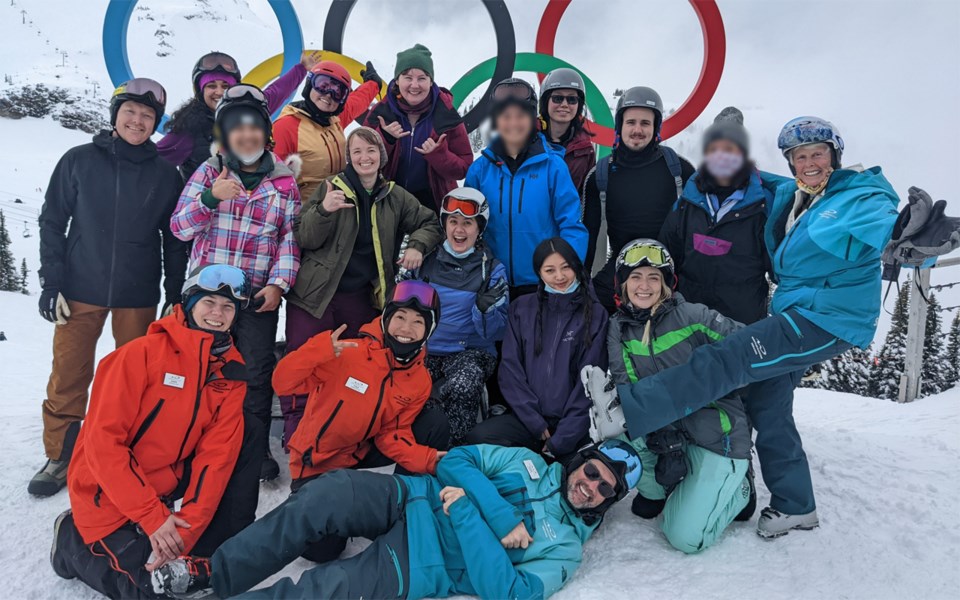When Whistler local Miranda King first heard the words “I’m sorry, it’s cancer,” her initial thoughts didn’t have anything to do with her own fears.
“The first thing that I was worried about was telling my fiancé and my mom—it wasn’t about me,” she said. “It was about having to tell other people, and feeling bad that they’re going to be sad.”
But eventually, the anger showed up, alongside the “annoying,” “tough” side effects of chemotherapy and the unexpected heartache associated with losing her hair. King moved to the resort from Wales seven years ago, before she was diagnosed with Stage 2 breast cancer in September 2019 at 29.
“It was a ride,” recalled King, now 32. “It sucked. You feel like you’ve got this path laid out for you, and it’s like the rug gets pulled from under you, and everything’s kind of derailed.”
Dealing with a cancer diagnosis in your twenties means, “you go for your treatments, and you’re the youngest one in the room,” she said. “That was really hard. You feel like you can’t connect very well with other patients that you bump into when you’re in the chemo room, or waiting for radiation. I was just like, ‘Is there anything for my age group?’
“And I guess it’s not really even age group; it’s more like phase of life. I was gearing up to have a mortgage, and maybe have kids,” she explained. But then, all of a sudden, “you can’t do that, you have to put everything on hold.”
For King, that’s where Young Adult Cancer Canada (YACC) came into play.
The national network is comprised of hundreds of young adults affected by cancer, and aims to support those aged 18 to 39 who are “living with, through, and beyond cancer,” while offering a “connection to peers, bridge out of isolation, and source of inspiration.” The group is also open to young adults who were previously diagnosed with childhood cancer, but are seeking support as they move into the next stage of their lives.
King found the organization while searching for resources online, eventually making her way to Ontario for a YACC retreat in early 2020. She stayed for four days, with 30 people close to her age who had been dealt a similar hand.
“We could talk candidly, and go with the dark humour without the funny looks you get from people who haven’t gone through [cancer],” King said.
“I remember at the beginning of my treatment, I just did what the doctors told me, and then I tried to go back to hanging out and pretending it wasn’t really happening—I was very much in denial for a lot of it. I think the retreat I went on with YACC was the first time I acknowledged that I was sick, but it was OK. And it was OK because of the people that you surround yourself with.”
She added, “I’m still talking to a lot of those people now.”
Today, King—who said her doctors no longer see any evidence of the disease and is “doing well, all things considered”—shares her experiences through her role as one of YACC’s leaders for a chapter called Localife Vancouver, spearheading events for those living in the Lower Mainland area. The organization approached King to ask if she was interested in the volunteer position about a year after she finished cancer treatments. “And I was happy to do that,” she said. “[YACC] helped me so much.”
One of those events took place earlier this month, when a group of 15 young adults between 18 and 34 years old took to Whistler Blackcomb’s slopes for a day of snowy fun on March 2. Whistler Blackcomb provided lift passes, rentals and instructors while Whistler Connection helped the group make their way up the Sea to Sky from Vancouver “at a very compassionate rate,” said King.
“I think everyone had an awesome time,” she said. “We had a really great team of instructors, and it was a pretty good snow day. Everyone came away learning something new, which is cool—either improving their skills or skiing or snowboarding for the first time.”
The group has held virtual events throughout the COVID-19 pandemic, “but this is the first time I’ve met them in person,” King said of her fellow chapter members. “It was really nice to just see their faces and see them being super excited with themselves—it was so fulfilling.”
Going forward, King and her co-leader aim to host monthly events for the group, ranging from simple catch-ups like picnics in the park to bigger events like their recent ski day.
It’s all in an effort to open up communication and build support systems to reach out to, said King.
“There are people everywhere that are going through something like that,” she said.
“And as soon as you can connect with people and feel like you’re not alone, it just makes it that little bit easier to deal with.”
For more information and resources, head to youngadultcancer.ca.




